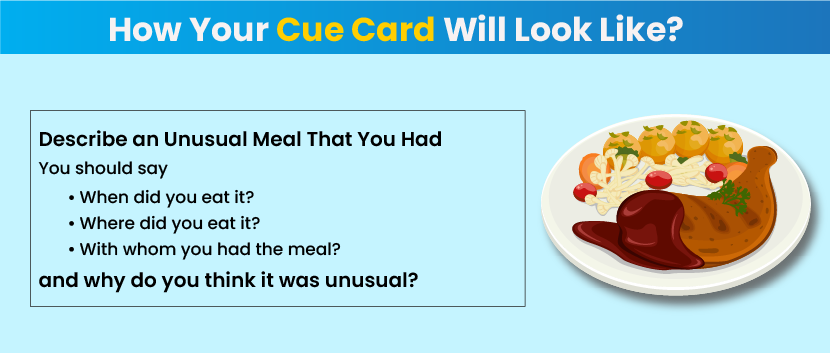In the IELTS Speaking test, you might be asked to describe something you do regularly that helps you work and study better. This is a common question in the cue card section, where you are given a topic and asked to speak for 1-2 minutes. The goal of this question is to assess your ability to describe a regular activity or habit that improves your productivity, either in your work or studies. To answer this question effectively, it’s important to think about what helps you stay focused, manage your time, or enhance your overall performance. In this blog, we will explore how to structure your response, provide useful vocabulary, and offer sample answers that will guide you on how to deliver a strong response during your IELTS Speaking exam.

Table of Contents
The IELTS speaking part 2 is the another part of the speaking section. In this, the examiner gives you a prompt or topic on which you have to speak for 2 minutes. The topic can be anything from family, home, travelling, experience, or opinions. This blog is on “describe something you do regularly that helps you work and study better”. The skills assessed by the examiner are brainstorming and the ability to articulate your ideas well. The next section will talk about how you can answer this cue card.
For IELTS cue cards, you have to speak for two minutes. Moreover, you get a minute to prepare from the bullet points written right under the main topic. Thus, it is important to prepare well and practice with different topics. Here is the cue card on " describe something you do regularly that helps you work and study better":
and explain how you feel when you do it?
Let's learn how your potential cue card on "describe something you do regularly that helps you work and study better" will look. Refer to the image below.
Here is the first sample for “describe something you do regularly that helps you work and study better” for you to practice:
Lately, there have been several habits that have helped me improve the quality of my work and study routine. However, I would take this opportunity to talk about my habit of making a to-do list and a can-do list.
After struggling with procrastination and late-ins, I resorted to making a to-do list that helped me systematize and prioritize tasks. I also made a can-do list to plan for tasks that can be completed or started within that day.
I was striving to get out of my comfort zone and get things done. Moreover, my study routine had been affected by my negligence. Due to this behaviour, I also missed a lot of assignment deadlines. Hence, I was resolute not to repeat this mistake. Hence, I made a commitment to use my time wisely and not let my potential go to waste.
My decision to make a to-do list and add a can-do list was extremely useful. It made me prompt with my daily tasks, and I could also take time for myself and my well-being. For the last two months, I have been effectively exercising, working, and studying without delays and pending tasks. People often think that they should give up after failing a few times. However, being tenacious and firm is important to achieving consistency.
This feeling of accomplishment and achievement takes me over after I tick my last task of the day. Moreover, the best days are when I finish almost all my chores.
To conclude, I have experienced a huge change in my life overall after inculcating this regular activity. Most of which is positive.
Here is the second sample for “describe something you do regularly that helps you work and study better” for you to practice:
I have started doing a 30-minute workout every day to avoid physical and mental health ailments.
My daily morning or evening routines include heavy exercise. I spend half an hour each day burning calories, staying fit, and developing and enhancing my core strength.
Due to the lockdown during the COVID-19 pandemic, I was not engaged in much physical activity, which made me obese and lethargic. This was when I decided to do intense workouts at home daily. However, I started off with light exercise as initially, I was reluctant to move my body much.
When my exercises got heavier, I felt a change in the frequency of mood swings I was getting. Moreover, I also felt my rigorous activity was shaping my mind and my thoughts. I was using daily affirmations for my body and deeds. This helped me cope with my body image issues.
Currently, I am still uniform with the exercise. However, now, I usually have to schedule it in the evening due to work. Yet, these 30 minutes are enough to let out my annoyance and rage. Moreover, this is also how I deal with negative emotions like despair and misery.
In conclusion, regular exercise is the best remedy to maintain the wellness of the soul, body, and mind.
Here is the third sample for “describe something you do regularly that helps you work and study better” for you to practice:
I take a walk outside instead of confining myself to the bed when I feel low.
One of my best regular habits is to take a walk in the park outside when I am stressed or unable to focus. I usually choose a silent alley with an old park on one side and residential buildings on the other. I walk without any headphones or earpieces, as I prefer silence and solace to shift my focus on the present.
I had to sit on a screen consistently for my work. Due to increased screen time, I developed insomnia and had trouble focusing.
Initially, I was unable to focus while walking, and it did not help as I was habitual in thinking about my work constantly. However, with timely breaks and practice, I was able to make this a regular activity that improved my sleep, focus, and posture.
I walk at least 3 times everyday to build and enhance my attention span when I am working without overloading my brain with stress or straining my eyes. I feel energetic every time I sit back at my desk to work.
To conclude, observing the outer world and navigating through my inner world is great. For me, this counts as productivity!
Now, let us look at the vocabulary for IELTS cue card.
The list below mentions the lexical resources. There are difficult words and their meanings below:
| WORD | MEANING |
|---|---|
| Procrastination | The act of putting off doing something that you should do till another day or time because you don’t want to do it. |
| Striving | To try very hard to do or get something |
| Negligence | Not being careful enough |
| Deadlines | A time or date before which something must be done or finished |
| Resolute | Having or showing great determination |
| Commitment | Being prepared to give a lot of your time and attention to something because you believe it is right or important |
| Potential | That may possibly become something, happen, be used, etc. |
| Prompt | Immediate; done without delay |
| Effectively | In a way that successfully produces the result you wanted |
| Pending | Being in continuance, not yet complete. |
| Tenacious | Not likely to give up or let something go; determined |
| Firm | Strong and steady or not likely to change |
| Chores | a duty or task you're obligated to perform, often one that is unpleasant but necessary. |
| Inculcating | To make somebody learn or remember ideas, habits, etc., especially by repeating them often |
| Workout | A period of physical exercise, for example when you are training for a sport or keeping fit |
| Ailments | Any illness that is not very serious |
| Obese | (used about people) very fat, in a way that is not healthy |
| Engaged | (used about a person) busy doing something |
| Lethargic | Relating to, or characterized by laziness or lack of energy |
| Intense | Very great, strong, or serious |
| Reluctant | Not wanting to do something because you are not sure it is the right thing to do |
| Frequency | The number of times something happens in a particular period |
| Rigorous | Done very carefully and with great attention to detail |
| Affirmations | It means to assure, or agree |
| Deeds | Something you do; an action |
| Body Image | A combination of thoughts and feelings that you have about your body. |
| Uniform | Not varying; the same in all cases or at all times |
| Schedule | A plan of things that will happen or of work that must be done |
| Annoyance | The feeling of irritation or being annoyed. |
| Despair | The state of having all lost hope. |
| Misery | The feeling of unhappiness and great suffering. |
| Remedy | A way of solving a problem. |
| Alley | A narrow passage between buildings |
| Residential | An area that has a lot of buildings where people live and operate local large shops. |
| Attention Span | The length of time during which one (such as an individual or a group) is able to concentrate or remain interested. |
| Overloading | A too much of something in or on something |
| Straining | To injure a part of body by using it too much. |
| Energetic | Full of energy and enthusiasm |
| Productivity | The ability to do as much work as possible in a particular period. |
The below section mentions the follow-up questions with answers to help you understand the topic better. This is another part of the IELTS speaking section Moreover, you will also get to know how to answer these questions to get a good band score.
After IELTS speaking part 2, examiners ask a few related questions to discuss the cue card topic more deeply. Here are the follow-up questions for the above cue card "describe something you do regularly that helps you work and study better". This will help you to practice:
Q1. How do you prioritize your tasks to ensure your regular activity doesn't interfere with your study or work schedule?
I make a to-do list every day while planning which tasks need to be done first. I tend to prioritize the tasks that have a deadline. I adjust them so that my regular activities are not affected. When I devote adequate time to each task, I am able to achieve my daily set goals.
Q2. In what ways do you think this regular activity contributes to your overall well-being and effectiveness as a student or professional?
It has helped me build several good habits. Regular scheduling and planning of tasks have made it easy for me to reflect on my deeds every night. This not only motivates me to stay organized but also lets me have some time and avoid procrastination.
Q3. Have you noticed any specific improvements in your productivity or focus since incorporating this regular activity into your routine?
Yes, my productivity has been increasing upon tracking it every week. Moreover, I am getting things done and achieving punctuality in work as well as studies. This would not have been possible as this regular activity has brought discipline and management in my life.
Q4. Could you describe any challenges you've faced in maintaining this routine and how you've overcome them?
I decided to include this activity only two months ago. Hence, there have been multiple instances where I have struggled to stay on track or maintain consistency. What helped me make this a habit was persistence. I clung to this particular activity and did it even when I didn't want to.
Here are some tips to consider before taking the IELTS speaking sub-test.
Here are the tips and tricks to ace the IELTS speaking part 2 on the first attempt:
Looking for Best Courses to Study in UK ?
UK offer courses in several fields for the students
UK offer courses in several fields for the students to pursue as per their interests
To conclude, cue cards are one of the tasks in the IELTS speaking section. This sub test requires you to practice well. Thus, these were answers to a cue card on "describe something you do regularly that helps you work and study better." You can also practice other topics to get familiar with the format. Moreover, there are online IETLS classes for you to enrol in. This can give you the supervision of an experienced trainer.

We are available in :
BangaloreAhmedabadJaipurHyderabadKeralaPuneChandigarhMumbaiGurgaonChennaiKolkataTrivandrumNoidaKochiCalicutKottayamKollamThrissurIndoreUdaipurdisclaimer:logos and other registered trademarks of universities used on this platform are held by their respective owners. Gradding does not claim ownership or association on them, and their use is purely for informational and illustrative purposes.






